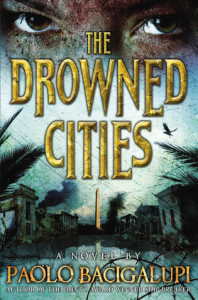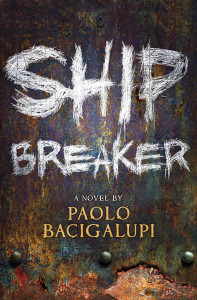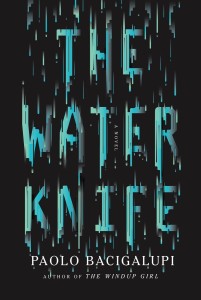At Fiction Unbound, we try to be equitable and spread our love of books and authors widely, but we happily admit that we have some favorites. For example, Colorado’s own Paolo Bacigalupi, award-winning author of The Windup Girl and The Water Knife (reviewed here), and the post-apocalyptic YA novels Ship Breaker and The Drowned Cities.
Bacigalupi's latest release, Tool of War, is a follow-up to Ship Breaker and The Drowned Cities. With the novel hitting stores October 10, editors Lisa Mahoney, CS Peterson and Mark Springer were fortunate to get our hands on an advance copy so we could bring you this review. We won’t spoil any of Tool of War’s surprises, but beware: we can’t talk about the new novel without giving away a few plot points from the earlier books. You’ve been warned. (And really, if you haven’t read Ship Breaker and The Drowned Cities yet, what are you waiting for?)
Like its predecessors, Tool of War is set in a near-future America ravaged by climate change, social and economic collapse, and violence. The novel continues the story of the title character, Tool, who was first introduced in Ship Breaker and returned with a vengeance in The Drowned Cities. Tool is an “augment,” a half-human warrior bioengineered “from the genes of dogs and tigers and men and hyenas,” as he describes himself. Augments are bred to be loyal to one master, living only to obey. Although Tool is in hiding, he stands out as an anomaly: he serves no master.
In Ship Breaker and The Drowned Cities, Tool is a supporting character; in Tool of War, he takes center stage. The novel opens some time after the conclusion of The Drowned Cities. Tool has taken command of an army of soldier boys and conquered the warring factions that have been fighting for control of the half-submerged ruins of the mid-Atlantic coast. In the drowned cities’ environment of perpetual war, he has fulfilled his genetic destiny and become the ultimate warlord. When the last rival faction surrenders, we find Tool suddenly confronting something he has never experienced or planned for: peace. It is an unsettling prospect, but Tool decides to embrace the change when his soldier boys surprise him by looking to him for continuing leadership. He has adapted before; now he will do so again.
Just when Tool thinks he might be able to move beyond the violence and slaughter that have defined his life, his creators—his gods—rain fire from the sky in an attempt to destroy him. Tool escapes, badly wounded, but the future he imagined is burned away before it could even begin.
In the breathless, bloody chapters that follow, Tool is pursued by General Caroa of the Mercier Corporation, a heavily militarized mega-corp that controls large swaths of the globe. Again, no spoilers here, but rest assured: as the story unfolds, we finally discover how a half-man designed and trained to be both a perfect killing machine and an obedient slave found the freedom to make his own choices. The secrets and forgotten memories of Tool’s past raise thought-provoking questions about biological determinism, free will and the unforeseen consequences of genetic engineering. Is Tool destined to be nothing more than a tool of war, a weapon created to serve his masters, a slave to his genes and his conditioning? Or does he truly have the power to choose what he will become? With General Caroa determined to see him dead, Tool must fight to find the answers to these questions and discover whether his freedom is real or just an illusion.
All of this makes Tool of War a thrilling read, and a satisfying conclusion to the story of one of Bacigalupi’s most memorable characters.
Our verdict: Go out and buy the book next Tuesday!















Cadwell Turnbull's new novel — the first in a trilogy — imagines the hard, uncertain work of a fantastical justice.